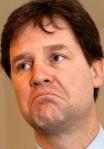Deputy PM considering moving 2015 Scottish Elections date?
 I am returning after a long spell away from this blog. I am pleased to announce that my absence is now at an end, and I look forward to posting with my usual regularity – i.e. every now and then!
I am returning after a long spell away from this blog. I am pleased to announce that my absence is now at an end, and I look forward to posting with my usual regularity – i.e. every now and then!
According to BBC News, the Deputy Prime Minister, the Rt. Hon. Nick Clegg, is in talks with the Scottish First Minister, Alex Salmond, about moving the date of the Scottish Parliament elections in 2015. Apparently, Mr. Clegg is concerned that the election will coincide with Westminster’s, assuming Mr. Cameron’s pledge to fix election dates goes through.
I am rather puzzled as to why Mr. Clegg is doing this. Seeing as his party is currently pushing for fixed term elections for the House of Commons (of which I can appreciate the merits), I do not see how he can legitimately argue for Scotland’s Parliament to move for his convenience. It defeats the entire point of elections being fixed. Additionally, I do not see such a move being appreciated by many Scots, who will see interference in the Scottish Parliament’s electoral timetable (which is a Reserved Matter under the Scotland Act 1998), as unwelcome encroachment by Westminster.
The United States has a myriad of elections all the time coinciding on the same day, ranging from General, presidential, gubernatorial, senatorial and State elections. It doesn’t seem to go down with any problems there. Why not here?
It is for similar reasons that I question criticisms by some quarters that the planned referendum on electoral reform for Westminster in 2011 should not coincide with the Scottish and Welsh elections. Surely maximum turnout can only be a plus? Why would they be inviting lower turnout and increased cost, by forsaking the opportunity to kill two birds with one stone?
If anybody can propose a rationale for this, I would be interested to hear it.

The rationale?
1: Fixed election dates is a Conservative plan, not a Lib Dems plan. The Deputy PM (and his party) is only voting for it as part of the coalition agreement. It is not a coincidence that the coalition has chosen a Lib Dem for this act.
2: Scotland does not have a tendency to vote Lib Dem (or Tory, for that matter) in large numbers. Those who turn out for Scottish elections (and not those for Westminster) are probably much more likely to vote for somebody other than the Lib Dems or Tories. Successful politicians rarely put ideals above practical actions that are needed to get elected.
This, of course, assumes that the two elections would be run together and anybody in Scotland showing up to vote would be handed two ballots. I don’t know how they run things in Scotland, but it would be quite odd to have to decide which election to attend, as if they were conflicting dinner invitations.
Steve: Hmm, I was under the impression it was more of a Liberal idea, for a number of reasons: firstly, they have been bleating on about it for years, particularly bitterly when Mr. Brown decided not to ask the Queen for a Dissolution of Parliament in late 2007. Secondly, avoiding an early Dissolution would be in their interests as I think they were perfectly aware coalescing with either main party would cost them votes, and they are banking of recovering these votes over a five-year term.
I am still unpersuaded that voters will be confused about multiple ballots. As I said, other countries seem to manage fine, and cost will be save by housing ballots in the same building. Heck, we do it here already – many an occasion has passed crisis-free in, say, London and local elections being held simultaneously.
I think, in reflection, you’re right to put it down to electoral expediency more than anything.